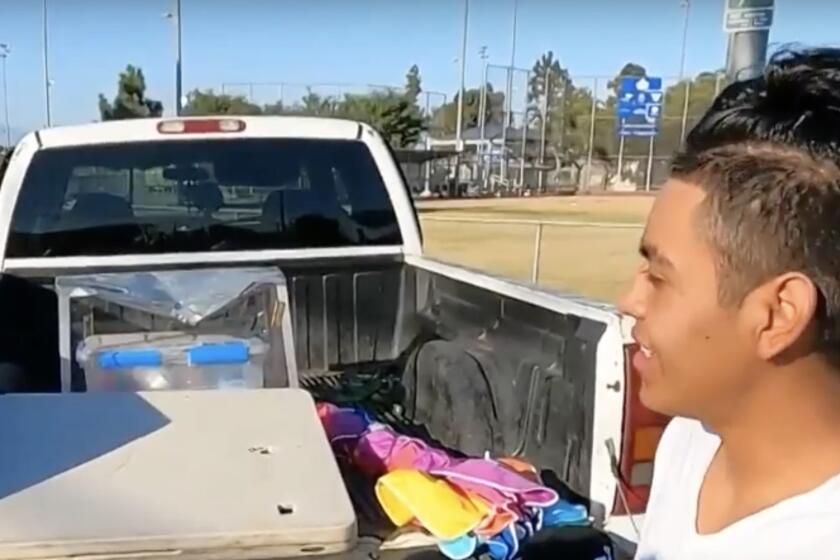Forfeiture Law Limits Seizures by Police : Drugs: Measure signed by Gov. Wilson weakens the rights of narcotics officers to take suspects’ property and turn it into crime-fighting cash.
In 1989, Simi Valley narcotics detectives seized $2.5 million from a Colombian money launderer and spent it on new officers, computers and high-tech detective gear. They won praise for turning drug profits into crime-fighting cash.
Oxnard narcotics officers seized a whole city block and several bank accounts because one tenant was selling cocaine. But four years later they were forced to give nearly all of it back because the innocent property owners’ attorney protested the unfair seizure.
Then in 1992, Malibu rancher Donald Scott was shot to death in a fruitless drug raid on his property. Ventura County Dist. Atty. Michael D. Bradbury denounced the fatal raid as little more than a botched land-grab under the asset-forfeiture law.
As attitudes toward California’s tough asset-forfeiture law changed, so did the law itself.
It expired at the end of last year after failing to muster enough support for renewal. And on Friday, a new, weaker law--forged as a compromise between supporters and critics of the old law--was signed by Gov. Pete Wilson.
Now the fat times for law enforcement appear to be over.
For nearly five years, Ventura County’s police agencies had used the drug asset-forfeiture law to hire more personnel and buy better gear with the millions in cash and property they seized from suspected dope dealers.
But when the tough 1989 law authored by Assemblyman Richard Katz (D-Sylmar) expired Dec. 31 amid statewide criticism, it all but cut off the windfall that had been fattening California’s narcotics squads with seizures from the guilty and innocent alike.
In its place stood a weaker 1988 forfeiture law written by Assemblyman Gary Condit (D-Modesto), one that sharply limited such seizures and has left some forfeiture-fed programs starving for funds.
Furthermore, the 1988 law became the subject of legal squabbles over whether it remained in effect. The debate prompted Ventura County prosecutors to temporarily suspend the filing of seizure cases earlier this year.
The compromise bill signed Friday by Gov. Wilson ensures law enforcement has a way to seize drug profits, but includes protections for innocent people.
Like the Condit law, the new law requires a criminal drug conviction for forfeiture. It also requires training and auditing for agencies involved and a pre-seizure hearing for each case. And it requires police to sell or dispose of seized property rather than use it themselves.
Police and prosecutors had praised the now-defunct Katz law as an effective, far-reaching weapon because no criminal conviction was needed to seize dealers’ profits.
By taking away houses, cars and bank accounts, officers said they could shut down drug rings--even when they could not muster enough evidence to prove the dealer’s guilt beyond a reasonable doubt.
And in the biggest Ventura County seizure to date, Simi Valley police used $2.5 million in cash they seized in 1989 from Colombian drug-money launderer Otoniel Urrego to buy a half-million-dollar computer system, enhance their DARE program and back countless undercover narcotics stings.
*
Yet the Katz law was also criticized for letting police abuse their power by taking cash and property from innocent people.
In 1989, Oxnard police seized an entire block of businesses and $270,000 in business accounts because one business tenant was convicted of possessing cocaine for sale. It took four years for the innocent owners to reach an agreement with prosecutors to pay a settlement and win back their property and their legitimately earned money, said their lawyer, David Patrick Callahan.
And in the notorious drug raid on Donald P. Scott’s Ventura County ranch near Malibu, Los Angeles County sheriff’s deputies thought marijuana was being grown there and wanted to seize the property, concluded Dist. Atty. Michael D. Bradbury.
Bradbury determined the Los Angeles County deputy shot the gun-wielding Scott in self-defense, but criticized the Los Angeles sheriff’s motives in the case, saying the department was hungry for the 200-acre ranch.
George Eskin, a veteran Ventura County defense lawyer and former prosecutor, said: “My problem with the law and with what was occurring before the old law died is that it invited law enforcement misbehavior. There was an incentive to do a variety of things that were improper. . . . It turned them into bounty hunters.”
*
The federal asset forfeiture law is even tougher than the Katz law.
It allows agents to seize any property where there is merely probable cause of drug involvement, while the Katz law set minimum amounts of drugs to qualify property for seizure.
But federal forfeiture is pursued mostly in high-profile cases where the alleged drug crime violates federal law, leaving the vast majority of cases in California to state law.
Meanwhile, law enforcement officials say, Ventura County’s drug dealers have grown steadily more careful.
More are selling drugs out of rented cars and apartments rather than their own expensive sports cars and lavish homes. And more are piping their profits into offshore bank accounts, making the drug money harder to track and seize.
“There’s been a significant drop-off there, and it’s my impression from what I’m hearing and what I see that we’re not getting the big cases anymore,” Chief Deputy Dist. Atty. Kevin McGee said. “The big cases are falling under federal law.”
Yet federal seizure cases cracked by state and local narcotics officers have not increased noticeably, said Assistant U.S. Atty. Eric Honig, chief of the Los Angeles asset forfeiture section.
*
“We let (state and county prosecutors) know right from the beginning we would not accept any cases that would circumvent the intent of the state law,” Honig said. “If there’s a violation of state law, there has to be a concurrent violation of federal law for us to take the case. . . . Generally, the minimum case we have involving currency is $10,000.”
And at a local level, the numbers paint a picture of dramatically shrinking seizures since the Katz law expired.
From January to June in 1992, the Ventura County district attorney’s office processed 74 seizure cases with a total value of $265,000. In the same period this year, there were only 20 such cases filed, with a value of $70,000, McGee said.
For a police department such as Simi Valley’s, the falloff in drug money seizures could mean a dramatic cutback in certain services--or an increasing need to dip into the city’s general fund.
Drug money has enriched the Simi Valley department to the tune of more than $6 million in the past 10 years, allowing it to buy a new radio system, surveillance gear and a computer-aided dispatch system worth more than half a million.
This fiscal year, Simi Valley is paying the salaries of 10 employees, including five detectives and a records clerk, plus officers for DARE, anti-gang and in-school programs, using a special budget of $855,100 made up entirely of seized drug profits. The fund also is paying a hefty cellular phone bill for its narcotics detectives, officials said.
Yet the department’s asset-forfeiture bank account, bolstered heavily by the $2.5-million seizure of Colombian drug money in 1989, is close to running dry.
*
Simi Valley Police Chief Willard R. Schlieter said he is weighing ways to rework the budget and save the extra officers.
“They’re really in kind of a vital position,” he said recently. “The assignments they’re working right now provide some depth to our program. It’s going to be a challenge to deal with it.”
Oxnard narcotics officers have also seen their asset-forfeiture money dwindle by as much as 30% this year from last year’s take of about $80,000, said Assistant Chief Tom Cady.
The department has been spending the money on bulletproof vests, wireless body microphones and even a voice mail system for the department.
“The intent of the law is for it to be used to enhance law enforcement’s ability in particular to respond to narcotics problems,” Cady said. “And as the funding sources get less and less . . . there’s a concern that you could end up supplanting (seizure money) with general fund money.”
Ventura County Sheriff’s Department narcotics deputies also report a dramatic drop in seizure cases, said Detective Michael Leslie.
In 1992, sheriff’s deputies’ income from seized property was $94,000, including 28 cars, in 28 separate cases, he said. In 1993, it had fallen to $68,000, with 26 cars in 32 cases. So far this year, deputies have seized property worth only $8,000, including four cars.
Staff cutbacks have contributed to the reduction, he said. But seizures also have fallen because of the expiration of the Katz law on New Year’s Eve and the increasing shrewdness of drug dealers, who sell out of apartments and rented cars more often now rather than risk having their own homes and vehicles seized.
“People are starting--and this is the trend--to get educated about what they use in these cases,” Leslie added.
*
To be sure, state and federal seizure laws still provide some windfall to departments, particularly from the big, interagency cases.
The Sheriff’s Department, for instance, hopes to reap $2 million under the federal seizure law from a three-year, interstate undercover investigation into the Colombian Cali cocaine cartel that seized nearly 1,000 pounds of cocaine and $5.8 million in cash--$1 million of it taken in Thousand Oaks, said Sgt. Gary Pentis.
And Oxnard, Ventura and Ventura County departments are hoping to share a chunk of $438,000 that was seized April 15 in a cocaine ring investigation with Inglewood police, said Oxnard Police Sgt. Mike Matlock.
Meanwhile, the expiration of the Katz law has pleased some in the Ventura County criminal defense bar.
Defense attorney Eskin argued that the old law unjustly took assets from some who were never convicted--and that it dropped an especially large hammer on some innocent suspects who could not afford to fight the seizures.
“I think a majority of the public feels that law enforcement should not have the power to seize property in the absence of being able to establish the person’s guilt,” Eskin said.
He recalled one client who had all $458 of his just-cashed paycheck seized when police found marijuana residue in the ashtray of his car.
*
“That doesn’t mean that there weren’t also some legitimate cases that we would applaud--I have no sympathy with a major drug dealer who loses his yacht or airplane to law enforcement,” Eskin said. “But I’m concerned about the little guys. . . . The government should not be coming around and taking property without due process.”
And defense attorney David Callahan said the law was so tough that most seizures were “just like taking candy from a baby.”
“The whole idea of the forfeiture statute was to get these kingpins who make hundreds of thousands of dollars and put the money into palatial estates, speedboats and other trappings of leisure, and teach them that crime doesn’t pay,” Callahan said.
In fact, he said, most Katz law cases involved low-income people arrested for selling drugs to support a habit, who wound up losing their only cars and houses, leaving their families homeless and destitute.
But law enforcement officials argue that unless the law is strengthened again, the extra support narcotics investigations and other forfeiture-funded programs may continue to shrink.
“When they run out of money, there’s one group that’s going to suffer, and that’s the public,” said Sheriff’s Cmdr. William Wade, whose major crimes unit oversees drug seizures and has in the past paid narcotics detectives with asset-forfeiture money.
“That’s an avenue where the crooks are contributing to the enforcement action,” he said. “And by losing the forfeiture money, the agencies are either going to have to draw funds from the general fund . . . or they’re going to have to reduce their activity. Either way, the public loses.”
More to Read
Sign up for Essential California
The most important California stories and recommendations in your inbox every morning.
You may occasionally receive promotional content from the Los Angeles Times.










